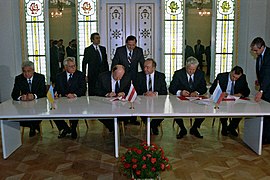
Back Belovej razılığı Azerbaijani Белавежскія пагадненні Byelorussian Белавескія пагадненьні BE-X-OLD Беловежко споразумение Bulgarian Acords de Belaveja Catalan Bělověžská dohoda Czech Беловежа килĕшĕвĕсем CV Cytundebau Belovezh Welsh Minsk-aftalen Danish Belowescher Vereinbarungen German
You can help expand this article with text translated from the corresponding article in Russian. (December 2021) Click [show] for important translation instructions.
|
 The signing ceremony at Viskuli Government House | |
| Type | Treaty establishing a loose regional organisation |
|---|---|
| Signed | 8 December 1991 |
| Location | Viskuli, Belovezh Forest, Belarus (de facto) Minsk, Minsk Oblast, Belarus (de jure) |
| Effective | |
| Signatories | |
| Parties | |
| Depositary | |
| Languages | Belarusian, Russian, Ukrainian |
The Belovezha Accords (Belarusian: Белавежскае пагадненне, romanized: Bielaviežskaje pahadniennie, Russian: Беловежские соглашения, romanized: Belovezhskiye soglasheniya, Ukrainian: Біловезькі угоди, romanized: Bilovezʹki uhody) is the agreement declaring that the Union of Soviet Socialist Republics (USSR) had effectively ceased to exist and establishing the Commonwealth of Independent States (CIS) in its place as a successor entity. The documentation was signed at the state dacha near Viskuli in Belovezhskaya Pushcha, Belarus on 8 December 1991, by leaders of three of the four republics (except for the defunct Transcaucasian SFSR) which had signed the 1922 Treaty on the Creation of the USSR:[1]
- Belarusian Parliament Chairman Stanislav Shushkevich and Prime Minister of Belarus Vyacheslav Kebich
- Russian President Boris Yeltsin and First Deputy Prime Minister of the RSFSR/Russian Federation Gennady Burbulis
- Ukrainian President Leonid Kravchuk and Ukrainian Prime Minister Vitold Fokin
As Shushkevich said in 2006, by December "the union had already been broken up by the putschists" who in August 1991 tried to remove Mikhail Gorbachev from power to prevent the transformation of the Soviet Union into what Shushkevich described as "a confederation". The three wanted to avoid what happened in the breakup of Yugoslavia and "there was no other way out of the situation than a divorce."[2]
- ^ "14 Years of Belavezha Accords' Signing". Charter'97. 8 December 2005. Archived from the original on 3 February 2007.
- ^ "Soviet Leaders Recall 'Inevitable' Breakup Of Soviet Union". Radio Free Europe. 8 December 2006. Archived from the original on 15 June 2008. Retrieved 8 December 2006.